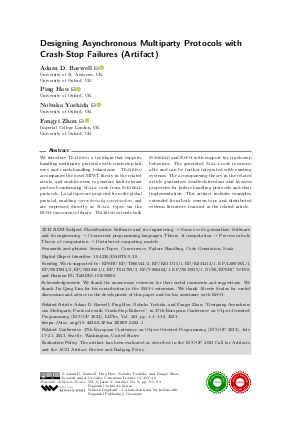Designing Asynchronous Multiparty Protocols with Crash-Stop Failures (Artifact)
Authors
Adam D. Barwell  ,
Ping Hou
,
Ping Hou  ,
Nobuko Yoshida
,
Nobuko Yoshida  ,
Fangyi Zhou
,
Fangyi Zhou 
-
Part of:
Issue:
Special Issue of the 37th European Conference on Object-Oriented Programming (ECOOP 2023)
Part of: Volume: DARTS, Volume 9 (ECOOP 2023)
Part of: Conference: European Conference on Object-Oriented Programming (ECOOP)
Part of: Journal: Dagstuhl Artifacts Series (DARTS) - License:
 Creative Commons Attribution 4.0 International license
Creative Commons Attribution 4.0 International license
- Publication Date: 2023-07-11
Artifact Description

PDF
DARTS.9.2.9.pdf
- Filesize: 0.59 MB
- 3 pages
Document Identifiers
Subject Classification
ACM Subject Classification
- Software and its engineering → Source code generation
- Software and its engineering → Concurrent programming languages
- Theory of computation → Process calculi
- Theory of computation → Distributed computing models
Keywords
- Session Types
- Concurrency
- Failure Handling
- Code Generation
- Scala
Metrics
- Access Statistics
-
Total Accesses (updated on a weekly basis)
0Document
0Metadata
Artifact
DARTS-9-2-9-artifact-94cc09960ca3a9558cc30925291eca5d.tar.gz
(Filesize: 1.28 GB)
MD5 Sum:
94cc09960ca3a9558cc30925291eca5d
(Get MD5 Sum)
Artifact Evaluation Policy
The artifact has been evaluated as described in the ECOOP 2023 Call for Artifacts and the ACM Artifact Review and Badging Policy
Abstract
We introduce Teatrino, a toolchain that supports handling multiparty protocols with crash-stop failures and crash-handling behaviours. Teatrino accompanies the novel MPST theory in the related article, and enables users to generate fault-tolerant protocol-conforming Scala code from Scribble protocols. Local types are projected from the global protocol, enabling correctness-by-construction, and are expressed directly as Scala types via the Effpi concurrency library. Teatrino extends both Scribble and Effpi with support for crash-stop behaviour. The generated Scala code is executable and can be further integrated with existing systems. The accompanying theory in the related article guarantees deadlock-freedom and liveness properties for failure handling protocols and their implementation. This artifact includes examples, extended from both session type and distributed systems literature, featured in the related article.
Cite As Get BibTex
Adam D. Barwell, Ping Hou, Nobuko Yoshida, and Fangyi Zhou. Designing Asynchronous Multiparty Protocols with Crash-Stop Failures (Artifact). In Special Issue of the 37th European Conference on Object-Oriented Programming (ECOOP 2023). Dagstuhl Artifacts Series (DARTS), Volume 9, Issue 2, pp. 9:1-9:3, Schloss Dagstuhl – Leibniz-Zentrum für Informatik (2023)
https://doi.org/10.4230/DARTS.9.2.9
BibTex
@Article{barwell_et_al:DARTS.9.2.9,
author = {Barwell, Adam D. and Hou, Ping and Yoshida, Nobuko and Zhou, Fangyi},
title = {{Designing Asynchronous Multiparty Protocols with Crash-Stop Failures (Artifact)}},
pages = {9:1--9:3},
journal = {Dagstuhl Artifacts Series},
ISSN = {2509-8195},
year = {2023},
volume = {9},
number = {2},
editor = {Barwell, Adam D. and Hou, Ping and Yoshida, Nobuko and Zhou, Fangyi},
publisher = {Schloss Dagstuhl -- Leibniz-Zentrum f{\"u}r Informatik},
address = {Dagstuhl, Germany},
URL = {https://drops.dagstuhl.de/entities/document/10.4230/DARTS.9.2.9},
URN = {urn:nbn:de:0030-drops-182492},
doi = {10.4230/DARTS.9.2.9},
annote = {Keywords: Session Types, Concurrency, Failure Handling, Code Generation, Scala}
}
Author Details
Funding
Work supported by: EPSRC EP/T006544/2, EP/K011715/1, EP/K034413/1, EP/L00058X/1, EP/N027833/2, EP/N028201/1, EP/T014709/2, EP/V000462/1, EP/X015955/1, NCSS/EPSRC VeTSS, and Horizon EU TaRDIS 101093006.
Acknowledgements
We thank the anonymous reviewers for their useful comments and suggestions. We thank Jia Qing Lim for his contribution to the Effpi extension. We thank Alceste Scalas for useful discussions and advice in the development of this paper and for his assistance with Effpi.
Related Article
- Adam D. Barwell, Ping Hou, Nobuko Yoshida, and Fangyi Zhou, "Designing Asynchronous Multiparty Protocols with Crash-Stop Failures", in 37th European Conference on Object-Oriented Programming (ECOOP 2023), LIPIcs, Vol. 263, pp. 1:1-1:30, 2023. https://doi.org/10.4230/LIPIcs.ECOOP.2023.1
References
- Adam D. Barwell, Ping Hou, Nobuko Yoshida, and Fangyi Zhou. Designing asynchronous multiparty protocols with crash-stop failures. CoRR, abs/2305.06238, 2023. URL: https://doi.org/10.48550/arXiv.2305.06238.
- Nobuko Yoshida, Raymond Hu, Rumyana Neykova, and Nicholas Ng. The scribble protocol language. In 8th International Symposium on Trustworthy Global Computing - Volume 8358, TGC 2013, pages 22-41, Berlin, Heidelberg, 2014. Springer-Verlag. URL: https://doi.org/10.1007/978-3-319-05119-2_3.
